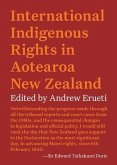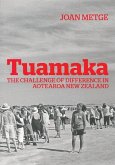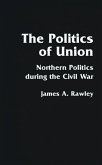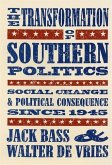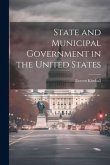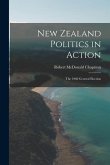- Broschiertes Buch
- Merkliste
- Auf die Merkliste
- Bewerten Bewerten
- Teilen
- Produkt teilen
- Produkterinnerung
- Produkterinnerung
Government and Politics in Aotearoa and New Zealand (Seventh edition) is the principal guide to the political context, institutions and processes of government in New Zealand.
Andere Kunden interessierten sich auch für
![International Indigenous Rights in Aotearoa New Zealand International Indigenous Rights in Aotearoa New Zealand]() Andrew EruetiInternational Indigenous Rights in Aotearoa New Zealand33,99 €
Andrew EruetiInternational Indigenous Rights in Aotearoa New Zealand33,99 €![Tuamaka: The Challenge of Difference in Aotearoa New Zealand Tuamaka: The Challenge of Difference in Aotearoa New Zealand]() Joan MetgeTuamaka: The Challenge of Difference in Aotearoa New Zealand33,99 €
Joan MetgeTuamaka: The Challenge of Difference in Aotearoa New Zealand33,99 €![The Politics of Union The Politics of Union]() James A RawleyThe Politics of Union16,99 €
James A RawleyThe Politics of Union16,99 €![The Transformation of Southern Politics The Transformation of Southern Politics]() Jack BassThe Transformation of Southern Politics41,99 €
Jack BassThe Transformation of Southern Politics41,99 €![The Jewel in the Sea The Jewel in the Sea]() Ian SharplinThe Jewel in the Sea13,99 €
Ian SharplinThe Jewel in the Sea13,99 €![State and Municipal Government in the United States State and Municipal Government in the United States]() Everett KimballState and Municipal Government in the United States33,99 €
Everett KimballState and Municipal Government in the United States33,99 €![New Zealand Politics in Action New Zealand Politics in Action]() Robert McDonald ChapmanNew Zealand Politics in Action26,99 €
Robert McDonald ChapmanNew Zealand Politics in Action26,99 €-
-
-
Government and Politics in Aotearoa and New Zealand (Seventh edition) is the principal guide to the political context, institutions and processes of government in New Zealand.
Hinweis: Dieser Artikel kann nur an eine deutsche Lieferadresse ausgeliefert werden.
Hinweis: Dieser Artikel kann nur an eine deutsche Lieferadresse ausgeliefert werden.
Produktdetails
- Produktdetails
- Verlag: Hurst & Co.
- 7th edition
- Seitenzahl: 500
- Erscheinungstermin: 9. November 2021
- Englisch
- Abmessung: 244mm x 189mm x 18mm
- Gewicht: 756g
- ISBN-13: 9780190325497
- ISBN-10: 0190325496
- Artikelnr.: 62305606
- Herstellerkennzeichnung
- Libri GmbH
- Europaallee 1
- 36244 Bad Hersfeld
- gpsr@libri.de
- Verlag: Hurst & Co.
- 7th edition
- Seitenzahl: 500
- Erscheinungstermin: 9. November 2021
- Englisch
- Abmessung: 244mm x 189mm x 18mm
- Gewicht: 756g
- ISBN-13: 9780190325497
- ISBN-10: 0190325496
- Artikelnr.: 62305606
- Herstellerkennzeichnung
- Libri GmbH
- Europaallee 1
- 36244 Bad Hersfeld
- gpsr@libri.de
Janine Hayward is Professor of Politics at the University of Otago. She teaches New Zealand politics (also environmental and Treaty of Waitangi politics), and researches issues on constitutional and electoral reform. She regularly advises local councils on electoral systems and representation. She edited the fifth edition of New Zealand Government and Politics (OUP 2015) Lara Greaves (Ng¿puhi, P¿keh¿, Tarar¿) is Lecturer in New Zealand Politics at the University of Auckland. Her research interests span M¿ori and New Zealand politics, survey methods, sexuality, social psychology, hauora and M¿ori identity. Lara is Associate Director (Policy Inc) of the Public Policy Institute (University of Auckland), where she works on the New Zealand Election study, and projects on identity and M¿ori policymaking (funded by the Health Research Council) and the M¿ori electoral roll (funded by a Royal Society Marsden Fast Start). Claire Timperley is Lecturer in Political Science and International Relations at Te Herenga Waka-Victoria University of Wellington. A graduate of the University of Virginia and the London School of Economics and Political Science, her teaching and research interests include feminist political theory, gender politics, critical pedagogy and the politics of Aotearoa New Zealand.
Introduction: Why Study the Politics of Aotearoa New Zealand?
PART 1: POLITICAL HISTORY AND IDENTITY
1.1 New Zealands Political Histories
1.2 Maori Political Histories
1.3 New Zealand Politics, 193584
1.4 New Zealand Politics, Post-1984
1.5 National Identity and Diversity
1.6 New Zealand in the World
PART 2: CRITIQUING THE STATE
2.1 The Importance of Political Theory
2.2 Democratic Theory
2.3 Pluralism
2.4 Kaupapa Maori Politics
2.5 Feminism
2.6 Marxism
PART 3: THE POLITICAL SYSTEM
3.1 Aotearoa New Zealands System of Government
3.2 Te Tiriti o Waitangi
3.3 The Constitution
3.4 Parliament
3.5 The Executive
3.6 Public Sector
3.7 The Judiciary
3.8 Local Government
PART 4: POLITICAL PARTIES AND ELECTIONS
4.1 Why Voting and Elections Matter
4.2 Elections and Voter Turnout
4.3 Political Parties
4.4 The MMP Electoral System
4.5 Maori Electorates
4.6 Media and Elections
PART 5: GOVERNMENT AND PARLIAMENT
5.1 Government and the Westminster Tradition
5.2 Government Formation
5.3 Prime Minister
5.4 Cabinet and Ministers
5.5 Members of Parliament
PART 6: POLICYMAKING AND PUBLIC PARTICIPATION
6.1 The Politics of Policymaking
6.2 The Policy Process
6.3 Critical Public Policy
6.4 Ministers, Officials and Advisers
6.5 Maori and Social Policy
6.6 Interest Groups and Lobbying
6.7 Civic Engagement
PART 7: CASE STUDIES OF POLITICS IN ACTION
7 How Does Politics Happen?
7.1 Inequality
7.2 Immigration Policy
7.3 Governing Through Disasters
PART 1: POLITICAL HISTORY AND IDENTITY
1.1 New Zealands Political Histories
1.2 Maori Political Histories
1.3 New Zealand Politics, 193584
1.4 New Zealand Politics, Post-1984
1.5 National Identity and Diversity
1.6 New Zealand in the World
PART 2: CRITIQUING THE STATE
2.1 The Importance of Political Theory
2.2 Democratic Theory
2.3 Pluralism
2.4 Kaupapa Maori Politics
2.5 Feminism
2.6 Marxism
PART 3: THE POLITICAL SYSTEM
3.1 Aotearoa New Zealands System of Government
3.2 Te Tiriti o Waitangi
3.3 The Constitution
3.4 Parliament
3.5 The Executive
3.6 Public Sector
3.7 The Judiciary
3.8 Local Government
PART 4: POLITICAL PARTIES AND ELECTIONS
4.1 Why Voting and Elections Matter
4.2 Elections and Voter Turnout
4.3 Political Parties
4.4 The MMP Electoral System
4.5 Maori Electorates
4.6 Media and Elections
PART 5: GOVERNMENT AND PARLIAMENT
5.1 Government and the Westminster Tradition
5.2 Government Formation
5.3 Prime Minister
5.4 Cabinet and Ministers
5.5 Members of Parliament
PART 6: POLICYMAKING AND PUBLIC PARTICIPATION
6.1 The Politics of Policymaking
6.2 The Policy Process
6.3 Critical Public Policy
6.4 Ministers, Officials and Advisers
6.5 Maori and Social Policy
6.6 Interest Groups and Lobbying
6.7 Civic Engagement
PART 7: CASE STUDIES OF POLITICS IN ACTION
7 How Does Politics Happen?
7.1 Inequality
7.2 Immigration Policy
7.3 Governing Through Disasters
Introduction: Why Study the Politics of Aotearoa New Zealand?
PART 1: POLITICAL HISTORY AND IDENTITY
1.1 New Zealands Political Histories
1.2 Maori Political Histories
1.3 New Zealand Politics, 193584
1.4 New Zealand Politics, Post-1984
1.5 National Identity and Diversity
1.6 New Zealand in the World
PART 2: CRITIQUING THE STATE
2.1 The Importance of Political Theory
2.2 Democratic Theory
2.3 Pluralism
2.4 Kaupapa Maori Politics
2.5 Feminism
2.6 Marxism
PART 3: THE POLITICAL SYSTEM
3.1 Aotearoa New Zealands System of Government
3.2 Te Tiriti o Waitangi
3.3 The Constitution
3.4 Parliament
3.5 The Executive
3.6 Public Sector
3.7 The Judiciary
3.8 Local Government
PART 4: POLITICAL PARTIES AND ELECTIONS
4.1 Why Voting and Elections Matter
4.2 Elections and Voter Turnout
4.3 Political Parties
4.4 The MMP Electoral System
4.5 Maori Electorates
4.6 Media and Elections
PART 5: GOVERNMENT AND PARLIAMENT
5.1 Government and the Westminster Tradition
5.2 Government Formation
5.3 Prime Minister
5.4 Cabinet and Ministers
5.5 Members of Parliament
PART 6: POLICYMAKING AND PUBLIC PARTICIPATION
6.1 The Politics of Policymaking
6.2 The Policy Process
6.3 Critical Public Policy
6.4 Ministers, Officials and Advisers
6.5 Maori and Social Policy
6.6 Interest Groups and Lobbying
6.7 Civic Engagement
PART 7: CASE STUDIES OF POLITICS IN ACTION
7 How Does Politics Happen?
7.1 Inequality
7.2 Immigration Policy
7.3 Governing Through Disasters
PART 1: POLITICAL HISTORY AND IDENTITY
1.1 New Zealands Political Histories
1.2 Maori Political Histories
1.3 New Zealand Politics, 193584
1.4 New Zealand Politics, Post-1984
1.5 National Identity and Diversity
1.6 New Zealand in the World
PART 2: CRITIQUING THE STATE
2.1 The Importance of Political Theory
2.2 Democratic Theory
2.3 Pluralism
2.4 Kaupapa Maori Politics
2.5 Feminism
2.6 Marxism
PART 3: THE POLITICAL SYSTEM
3.1 Aotearoa New Zealands System of Government
3.2 Te Tiriti o Waitangi
3.3 The Constitution
3.4 Parliament
3.5 The Executive
3.6 Public Sector
3.7 The Judiciary
3.8 Local Government
PART 4: POLITICAL PARTIES AND ELECTIONS
4.1 Why Voting and Elections Matter
4.2 Elections and Voter Turnout
4.3 Political Parties
4.4 The MMP Electoral System
4.5 Maori Electorates
4.6 Media and Elections
PART 5: GOVERNMENT AND PARLIAMENT
5.1 Government and the Westminster Tradition
5.2 Government Formation
5.3 Prime Minister
5.4 Cabinet and Ministers
5.5 Members of Parliament
PART 6: POLICYMAKING AND PUBLIC PARTICIPATION
6.1 The Politics of Policymaking
6.2 The Policy Process
6.3 Critical Public Policy
6.4 Ministers, Officials and Advisers
6.5 Maori and Social Policy
6.6 Interest Groups and Lobbying
6.7 Civic Engagement
PART 7: CASE STUDIES OF POLITICS IN ACTION
7 How Does Politics Happen?
7.1 Inequality
7.2 Immigration Policy
7.3 Governing Through Disasters


